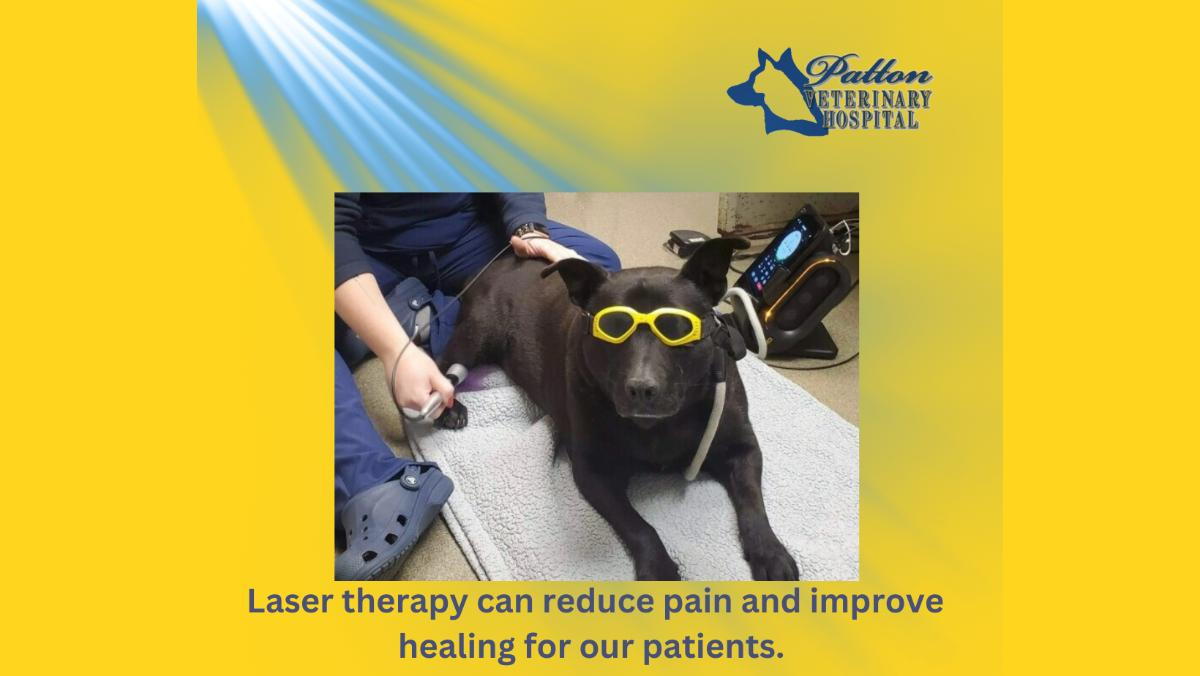Alternative Medicine: Laser Therapy

- posted: Jul. 09, 2023
Alternative Medicine: Laser Therapy
Lasers tend to conjure thoughts of futuristic images, but in reality, lasers are being used every day in veterinary medicine. Did you know, Patton Veterinary Hospital offers therapeutic laser sessions? What exactly is laser therapy and how do pets benefit?
First, there are several different types of lasers. Surgical lasers produce heat to cut and cauterize tissue. Cold lasers use specific wavelengths of light to activate a cellular “fuel” called ATP within cells. By increasing ATP, normal cell function is enhanced and tissues receive increased blood flow. Inflammation is reduced and cellular repair and healing are improved. This type of therapeutic laser is used to reduce swelling and bruising, to provide pain relief, and to stimulate tissue repair and regeneration.
Lasers can be used to treat painful conditions such as arthritis, fractures, and back pain as well as to reduce pain and inflammation in internal organs such as the bladder or pancreas. They are also used to treat skin conditions such as hot spots and ear infections, and they can be used to promote wound healing and to speed the healing time of surgical incisions. Laser treatments are safe and non-invasive and there is no discomfort during treatment.
For pets with arthritis who cannot take non-steroidal anti-inflammatories (NSAIDs) due to liver or kidney disease or other health issues or for which medications alone do not provide enough relief, laser therapy can be highly effective in reducing pain and improving mobility. Cats and pocket pets or exotics are especially good candidates for laser therapy since drug choices are often limited in these species. Laser therapy can also be used in conjunction with traditional medical therapies to improve pain control. Many patients show dramatic improvement during laser therapy.
The effects of laser treatments are cumulative and they are typically administered daily to every other day for acute conditions such as wound care and weekly for chronic conditions like arthritis. Depending on the number of areas being treated, a session may only take a few minutes but some sessions last 15-30 minutes if multiple joints or areas are being treated. Approximately 90% of patients should see improvement within the first three to four treatments. As with any therapy, individual responses may vary. If a pet does not seem to respond after four treatments, re-evaluation of his or her condition is warranted.
Laser therapy may also help to speed wound healing in large or infected wounds and may also improve surgical wound healing. We offer laser therapy to all surgical patients except those undergoing tumor removal. Laser therapy has been shown to reduce pain and inflammation and to improve blood flow to wounds and incisions. Patton Veterinary Hospital is proud to offer cold laser therapy for our patients for a variety of conditions. Ask our veterinarians or staff if laser therapy might be a good option for your pet.
This blog brought to you by the Patton Veterinary Hospital serving Red Lion, York and the surrounding communities.
Location
Patton Veterinary Hospital
425 E Broadway
Red Lion, PA 17356
